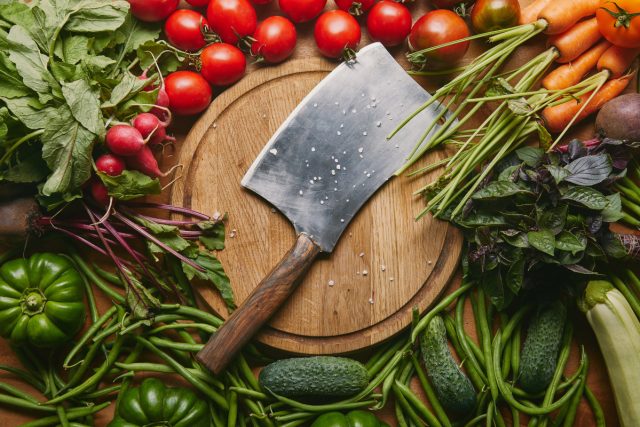A vegetable cleaver is a specialized kitchen knife designed primarily for preparing vegetables and fruits. It features a broad, rectangular blade with a straight cutting edge and a relatively thin profile compared to a meat cleaver. This design allows for precise, efficient slicing, chopping, and dicing of various types of produce without crushing or bruising them.
Table of Contents
Key Uses of a Vegetable Cleaver
- Chopping and Dicing: The wide blade makes it easy to chop and dice vegetables like onions, carrots, and potatoes quickly and uniformly.
- Slicing: Its sharp, straight edge is ideal for making clean, even slices of vegetables such as cucumbers, bell peppers, and tomatoes.
- Mincing: The flat blade allows for efficient mincing of herbs, garlic, and ginger by rocking the knife back and forth.
- Scooping and Transferring: The broad surface can be used to scoop up chopped ingredients and transfer them directly to a pot or pan, reducing the need for additional tools.
- Crushing: The flat side of the blade can crush ingredients like garlic cloves or nuts, releasing their flavors.
- Peeling and Shaving: The sharp edge can peel or shave thin layers off vegetables like cabbage or lettuce for salads and garnishes.
Advantages
- Versatility: A vegetable cleaver can handle a variety of tasks, reducing the need for multiple knives.
- Efficiency: Its design allows for quicker prep times due to its ability to perform multiple functions.
- Control: The weight and balance of the cleaver provide better control during cutting tasks, enhancing safety and precision.
Care Tips
- Sharpen Regularly: Keep the blade sharp for optimal performance and safety.
- Hand Wash: To maintain the blade’s quality, wash it by hand and dry immediately to prevent rust.
- Proper Storage: Store in a knife block or on a magnetic strip to protect the blade’s edge.



